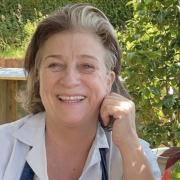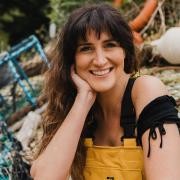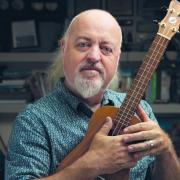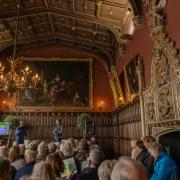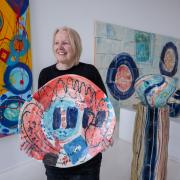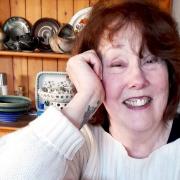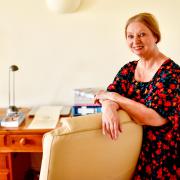Mathew Prichard, grandson of Agatha Christie talks about his reawakened memories, following the recent discovery of tape recordings of her voice more than 30 years after her death. He spoke about them to Matthew Newbury
"Eerie" was the succinct and wonderfully apt way that Mathew Prichard describes hearing the voice of his grandmother Agatha Christie's crackle to life on forgotten tapes more than 30 years after her death. "Comforting isn't quite the word, but they are very evocative."
Mathew talks with a genuine passion about the life and work of his famous relative to an enthralled audience at Torquay Museum, who have gathered to hear him share extracts from the 13 hours of recently discovered recordings to a sell-out audience of fans at Torquay Museum.
He described the tapes which formed notes for her biography as: "A piece of history in some way. Hopefully it helps you to learn more about the person behind the voice. She was modest, with a great sense of humour, and there was nothing more important to her than her work and her family."
Mathew's own warm memories of idyllic school summer holidays at her home at Greenway on the banks of the Dart clearly reveal even more of her love of both her family and her life in Devon.
"There was usually a big house party," he says, sharing a few moments with me before beginning his talk. "Not usually too many people of my own age, but it was a great family party, and my grandmother enjoyed that as it was usually the time of year when she had just finished writing her book, so it was family time.
"She loved swimming, so we went swimming at Broadsands. I don't know if we'd still do that these days, but we did then. And we went round the corner at Elbury Cove. See, I still remember the names. She even swam in the Dart occasionally. And we went for picnics and walks on Dartmoor and we played clock golf at Greenway. It was a young person's paradise really."
It was at Greenway decades later, just after Mathew's parents died, that he stumbled upon a dusty cardboard box in a store room while clearing out their possessions. The box, it turned out, contained 27 half-hour tapes and the Grundig Memorette machine that an ageing Christie had dictated her first draft of her autobiography onto in the mid-1960s.
Mathew didn't pay much attention to the find at first, unaware of its importance. The tape recorder was clearly corroded and the tapes unmarked, but a chance conversation with a techno-savvy friend led to a repair job and a remarkable discovery.
"My friend took out the batteries and managed to repair it, with severe danger of electrocuting himself - it was dripping with corrosive substances. It took two or three months, but one Friday morning he called and said 'You'd better get over here, I think we've cracked it'. And there was her voice..."
The tapes contain the raw material for the final third of her autobiography. Mathew suspects that when she had typed up the recordings of the first half of the chapters, she then recorded over them when dictating the remainder of the book. The autobiography took her 15 years to write and the tapes are believed to date from the mid-1960s. Agatha Christie: An Autobiography was published posthumously in 1977.
Mathew has deliberately not 'tidied up' the tapes. He explains: "There's lots of background noise, and the clicks are the on-off switch she would press when she was waiting for further inspiration. I prefer it like that. This is, after all, a piece of history that I had enormous pleasure in listening to over the course of the summer."
The importance of the tapes should not be underestimated; only two other recordings of her voice are known to exist, including a 1955 interview for the BBC and a 1974 recording for the Imperial War Museum sound archive in which she recalls her experiences in the First World War.
On these tapes, Christie talks about her honeymoon with her second husband, Max, on a little boat off the coast of Greece, and of her love for the Iraqi and Arabian people (they spent a lot of time in Syria and Iraq on archaeology trips). She also talks about her two most famous detective creations.
"People never stop writing to me nowadays to suggest that Miss Marple and Hercule Poirot should meet, but why should they meet? I'm sure they would not like meeting at all. Hercule Poirot, a complete egoist, would not like being taught his business or having suggestions made to him by an elderly spinster lady."
The tapes also reveal Agatha Christie's passion for the two South Devon houses that were so important in her life: Ashfield in Torquay and Greenway on the River Dart, where Mathew spent so many happy summers as a child.
"I think Ashfield, which was where she was born, just around the corner from where we are at the museum now, was crucial in her upbringing," Mathew tells me. "That's where she was educated privately, by governesses or whatever they called them in those days, and I think a happy and secure childhood was what gave her imagination the impetus to become so prolific later on."
But it is her former home at Greenway that Christie called "the loveliest place in the world". Mrs Mallowan (she was known locally by her married name) and her second husband, Max, spent their holidays there between 1938 and 1959, and their legacy as keen gardeners is still apparent in the stunning grounds of the estate. In 1959 the property was transferred by Agatha to her daughter, Rosalind Hicks, and from then until 2000 it was owned in various partnerships by her, her second husband, Anthony, and her son, Mathew.
In 2000 the property was generously donated to the National Trust by the family, with the restored building set to reopen in March next year. "I have hated it during the period whilst it's done up," Mathew moans. "It has looked unhappy with all the scaffolding and all the paraphernalia of the building project, and I can't wait for it to be open to the public, because I think then that the house will live again. For me it's been a house that has operated with people and once it gets people running through it again, I think I will remember it much better and I shall be a lot happier."
Hearing the tapes in the company of her grandson is a surprisingly moving experience and the reaction of the sell-out audience shows the endless fascination and enthusiasm that Agatha Christie fans have in the world's best-selling author. The tapes provide a mesmerising insight into her personality, and her passion for both her work and family life and I hope that at some point in the future they are made available for the public to access.
"When I knew her, she was a very happy person," Mathew reveals to me towards the end of his interview. "Very happy with what she had achieved and happy with what she was achieving, but still dedicated to the entertainment of others, which is why she went on writing books for such a long time.
"But I think in these tapes, something about the tone of them, does tell you something a bit more about her than just from reading her autobiography or reading her books. She was a wonderful person. Hardly a day or week passes where I don't in one form or another miss her."



